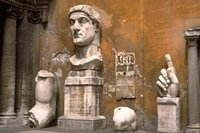 The reign of Constantine is certainly an important turning point in the history of Rome and in the history of the church. Please read through the Edict of Milan. Cite one line that particularly well shows a way in which Constantine changes things for the church.
The reign of Constantine is certainly an important turning point in the history of Rome and in the history of the church. Please read through the Edict of Milan. Cite one line that particularly well shows a way in which Constantine changes things for the church.
"Moreover, in the case of the Christians especially we esteemed it best to order that if it happens anyone heretofore has bought from our treasury from anyone whatsoever, those places where they were previously accustomed to assemble, concerning which a certain decree had been made and a letter sent to you officially, the same shall be restored to the Christians without payment or any claim of recompense and without any kind of fraud or deception"
ReplyDeleteThis excerpt in particular points out a few crucial points.
First of all, it acknowledges that property of the church (and of Christians in general) was stolen. Second, it mentions the property being sold for a profit by those that stole it and that they were not punished for it. Third, the Edict demands that the property be returned *without* payment being made.
This last one was critical. The Christians were, at the time, still recovering from having everything taken from them, including family and friends. Their property could be replaced, yes, but those who died could not. In their grief, Romans could very well have planned to use their state of grief to benefit.
But Constantine refused this before it even occurred. The property was ill-gained; one should not further profit from it by selling it back to the people it was stolen from.
And yes, it sounds unfair (what if someone bought an old gathering place and made it into their home?), it was obtained in an unfair manner.
The Christians, thanks to the edict, were able to continue rebuilding their finances and their religion with less problems, something they were no doubt appreciative of.
“We have also granted to the Christians and to all others full authority to observe that religion which each preferred. This is the line that I chose because it shows the end of persecution with religion and replacing it with religious toleration. This allows anyone to focus their faith on anything that they want to do. I think that this changes the Church so much because they can have happy people because they got what they wanted instead of being forced. Faith now is a matter of personal choice and how they see the world instead of being force fed stuff they maybe didn't want to learn about.
ReplyDelete“It is our wish that all persons in the cities of the empire shall be free to follow the religion that they choose, so that the divine favor may be granted equally to all.”
ReplyDeleteThis line demonstrates a major shift when Constantine formally grants Christians and others the freedom to practice their religion without fear of persecution. It shows the end of state-sponsored persecution of Christians and lays the base for Christianity to gain legal recognition and eventually imperial support.
Constantine orders that, "now any one of these who wishes to observe Christian religion may do so freely and openly, without molestation." This was a huge change from the previous arrangement where Christians were often severely persecuted. Christianity was in many cases illegal, so an edict protecting the Christians must have been an unbelievable relief.
ReplyDelete"We have also conceded to Christians and to all others full authority to observe that religion which each preferred.”
ReplyDeleteFor the first time, Christianity is no longer treated as a criminal or subversive cult but is granted legal protection and freedom of worship. The phrase “to Christians and to all others” shows that Constantine is not just tolerating Christianity quietly but publicly placing it on equal legal footing with traditional Roman religions. This change transformed the Church’s position in Roman society. Christians could worship openly, own property, rebuild churches, and organize without fear of persecution.
"we have given to those Christians free and unrestricted opportunity of religious worship." i think this one line is huge because while we've seen toleration it was always in a way of practice it in your homes and it was out of sight out of mind but with this it really does show the turning point because no longer will the Christians have to worry about the persecution that they faced.
ReplyDelete